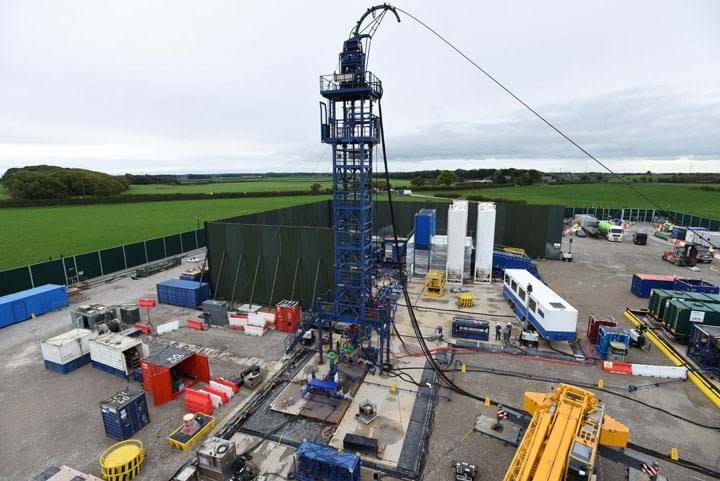UK Government issues temporary ban on fracking

THE UK Government has temporarily halted fracking on the basis of a new scientific study from the Oil and Gas Authority (OGA).
The OGA released an interim report on 2 November based on data from Cuadrilla’s first well at the Preston New Road site in Lancashire. Cuadrilla began fracking the well in October 2018 but work was suspended after numerous tremors occurred. The OGA commissioned four independent studies in February 2019 to investigate the tremors. The studies revealed that a previously unidentified strike-slip fault is the likely cause, and that the possibility of larger events could not be excluded if operations continue. The report said that data from the second well, which began operations in August but had to suspend work after a 2.9 magnitude tremor, would be needed to test and improve the studies.
Tom Wheeler, Director of Regulation at OGA, said: “The OGA’s considerations have been informed both by the seismic events and by independent scientific analysis of data from the first Preston New Road well. Based on these, the OGA believes that further detailed geomechanical analysis would be needed before we could evaluate with confidence whether hydraulic fracturing could resume in the Fylde, or elsewhere, consistent with the Government’s policy aims.”
In response to the report, the Government announced a “moratorium on fracking until compelling new evidence is provided.”
Andrea Leadsom, Business and Energy Secretary, said: “After reviewing the OGA’s report into recent seismic activity at Preston New Road, it is clear that we cannot rule out future unacceptable impacts on the local community. For this reason, I have concluded that we should put a moratorium on fracking in England with immediate effect.”
According to The Financial Times, Cuadrilla has spent £270m (US$348m) on fracking but has yet to produce any gas in commercial quantities. AJ Lucas, the Australian investor with a 48% share in Cuadrilla, has described the decision as disappointing and said it will give its full support to Cuadrilla. It said that Cuadrilla would continue to work with OGA to address its concerns on seismicity.
Questionable timing
Geoffrey Maitland, FIChemE and Professor of Energy Engineering at Imperial College London, said: “I believe this decision and its timing is politically and electorally motivated to make the Government look environmentally pro-active, keep the anti-fracking lobby happy and match the line of Labour and the Lib Dems – rather than being responsible and honest about the UK’s future cleaner energy needs and realistic routes for the transition towards zero-carbon emissions. It is using the evidence from the OGA report selectively to serve its electoral purposes.”
“The report does indeed say that it is not possible currently to predict accurately the magnitude of micro-seismic events resulting from fracking in particular locations. However, this misses the point – the concern should be about the actual impact of seismic events if they occur. The OGA report ... finds that seismic events of magnitude 2.5 ML, which they described as ‘likely’ and similar in strength to that which occurred on well PNR2, would be felt for distances of about 2 km from the epicentre, but with no expected impact on buildings or structures. If it chose, the Government could emphasise this evidence to allay public fears about the risks to their property and infrastructure. By removing support for fracking in the UK, the Government is taking a hypocritical stance, ignoring the fact that we import shale gas from the US to meet our current domestic heating demands.”
Jon Gluyas, Director of the Durham Energy Institute, Durham University, said: “The Government ban on fracking is both politically expedient in the run up to the general election and a neat way of ignoring the now inescapable truth that the projected shale gas potential for the UK is tiny at best. We have though, as a nation, wasted a decade hoping for more gas to heat our homes rather than installing ultra-low carbon geothermal heating like that used in much of Europe.”
Stuart Haszeldine, a Professor at the School of GeoSciences, University of Edinburgh, said: “UK regulators have been misled for too long by overzealous gas drillers seeking easy profits from the UK. The drillers have now been beaten by their failure to understand the natural sub-surface environments they sought to exploit. Time and again, fracking companies in the UK have made incorrect interpretations of the geological rock layering and incorrect interpretations of what the earthquake evidence was telling them.”
Separately, the Government has given the green light for a new coal mine in Cumbria, which had already been approved by the Cumbria County Council. The mine will produce coking coal and work is expected to begin on the site in early 2020. It will be the first new deep coal mine in the UK in more than 30 years.
Recent Editions
Catch up on the latest news, views and jobs from The Chemical Engineer. Below are the four latest issues. View a wider selection of the archive from within the Magazine section of this site.




